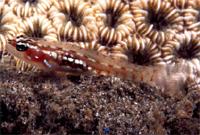
Photo credit: J. E. RandallIn a finding that broadens our understanding of the limits of animal "life history"--the life events that characterize a species's reproduction and survival strategy--researchers at James Cook University in Australia have discovered that the record for the shortest life span for a vertebrate animal is held by a tiny coral-reef fish. Living a maximum of just 59 days, the coral-reef pygmy goby Eviota sigillata leads a complex and hectic life.
Using the fishes' otoliths (ear stones), which contain minerals layed down in layers on a daily basis (similar to the annual rings of a tree), Martial Depczynski and David Bellwood of James Cook University studied the life cycle of the pygmy goby on the Great Barrier Reef. Hatching from minute eggs that are vigorously defended by the father, these fish develop as larvae in the open ocean for three weeks--nearly half of their lives--before locating and settling on a coral reef, where they grow to sexual maturity.
With a reproductive life span of just 25 days, the female pygmy goby lays only three clutches of eggs, totaling about 400 eggs, in a lifetime.
In a series of supplemental field studies, the researchers showed that many small reef fish may be under intense pressure from predators. Daily mortality rates of 2%–8% were common, indicating the severe biological time constraints and intense selective pressure that this community experiences. These findings on the shortest-living vertebrate, along with recent discoveries on coral reefs of the smallest and earliest-maturing vertebrate species, are helping to broaden our understanding of the range of vertebrate life histories and the potential for reef fish to contribute to this area of research. Coral-reef ecosystems represent exceptional biodiversity and environmental stability, and this recent research is beginning to unravel the possible reasons for the ability of these ecosystems to support extremes in vertebrate evolution.
Researchers included Martial Depczynski and David R. Bellwood from James Cook University in Australia.
Publishing in Current Biology, Volume 15, Number 8, April 26, 2005, pages R288–R289. http://www.current-biology.com
Source : Cell Press
 Print Article
Print Article Mail to a Friend
Mail to a Friend
